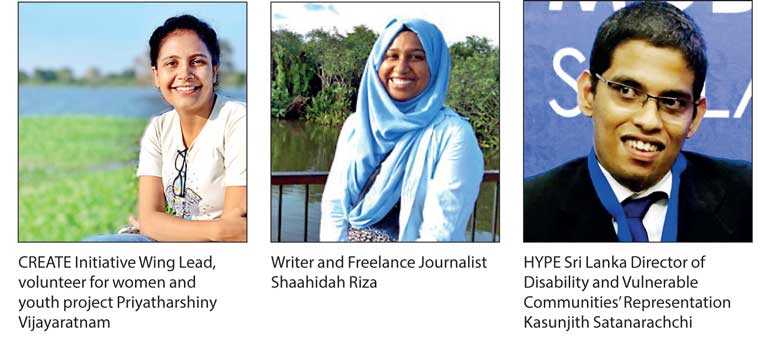Sunday Feb 22, 2026
Sunday Feb 22, 2026
Friday, 9 April 2021 00:00 - - {{hitsCtrl.values.hits}}

The British Council offered 100 emerging leaders from South Asia a unique opportunity to develop their leadership capacity and skills through a five week online, self-directed course.
This course has been developed by Clore Social Leadership UK. This program was initially piloted in Africa and based on its success was introduced in South Asia in 2020, to an initial cohort of 100. The five-week course for South Asia was successfully completed in February 2021.
Through the British Council Sri Lanka, 25 local participants, comprising a diverse group of social and gender activists, and aspiring leaders were part of the South Asian cohort. They were selected based on their track record of working in women’s rights and demonstrating genuine commitment to enhance their leadership skills.
“This course has been a great eye opener, the content was really helpful to enhance my knowledge and understanding in gender and leadership. It’s been a journey of self-reflection since the activities and content were more about oneself. If I can provide some examples, The SWOT analysis, the ‘why factor’ and the missing person activities were impactful for me,” expressed Priyatharshiny Vijayaratnam, Wing Lead, volunteer for women and youth project, CREATE Initiative.
During the programme the participants benefitted from live discussions, curated learning resources, reflective writing and practical tasks and were encouraged to network with fellow participants whilst sharing individual challenges and experiences.
The culmination of the leadership programme will include local awareness building initiatives, digitally and on the ground under three thematic areas; ‘Leadership for Disability and Inclusion’, ‘Online safety for women and girls’ and ‘Strategies to strengthen women’s access to digital technology, and digital opportunities for Women’s livelihood’.
“Taking part in this training and attending the live sessions, I was joined by a group of powerful women who had undergone experiences that are similar to mine. Learning from them, with the help of the digital teaching aide provided by the program, helped me dissect myself thoroughly, comprehend my strength and identify my weaknesses. The self-analysis was truly a game changer for me. It helped me mentally organise myself and face my fears head on,” were sentiments shared by Shaahidah Riza, a writer and freelance journalist.
Kasunjith Satanarachchi, Director of disability and vulnerable communities’ representation, HYPE Sri Lanka, said: “I want to be in the mainstreaming of gender and disability activism and to lead by example. Due to the stigmatisation and vulnerability of the disabled community, we need to provide support through systematic interventions. I want to reassure and rally forward to build the rights for women with disabilities. This training has allowed me to focus on the core purpose and to push my understanding of leadership where I lead from the front while never leaving anyone behind.”
Reiterating British Council’s commitment to gender equality and the need to develop a shared vision for the future, a two-day regional event titled ‘The Leadership for Gender Equality Summit’ was conducted to create an open forum for discussion and dialogue on the theme of ‘Leadership for gender equality’.
The event included panel discussions, workshops and fireside chats on the overarching theme of ‘Women in Leadership’. Over 30 experts from South Asia participated to share their opinions on different aspects of gender equality. In addition to the 100 South Asian participants, the event had representation from dynamic business leaders, policy makers and experts from international organisations such as the UN, leading corporates and philanthropic organisations. Following the conclusion of the event, The British Council together with the 25 local participants will host local events based on their learnings and experiences of the programme and the summit.
The British Council’s ambition to achieve gender equity and eliminate disadvantage is at the heart of all the work, recognising that the key issues for Sri Lanka are a very high rate of domestic violence, sexual harassment, social media exploitation, suicide rates, over protection of girls, and under employment despite good educational achievements.
Whilst addressing some of these issues directly, longer term interventions are aimed at attitudinal change, tackling harmful gender norms among women and girls, as well as men and boys, thus enabling the former to participate fully in society.
The programmes focus on reducing violence, creating role models, and tackling social media harassment through community-based interventions, as well as increasing aspirations for career opportunities, raising awareness and stimulating attitude change through providing a voice, a choice and agency for female empowerment and change.British Council’s Country Director Maarya Rehman said: “The ‘Leadership for gender equality program’ provides vital platforms for dialogue and discussion to contribute to leadership development of women and help them find equal footing in the world. We are proud to facilitate local participation for these important programmes and to promote a renewed vision for women to outdo gender stereotypes and be their own voice, transforming different sectors and their communities.”